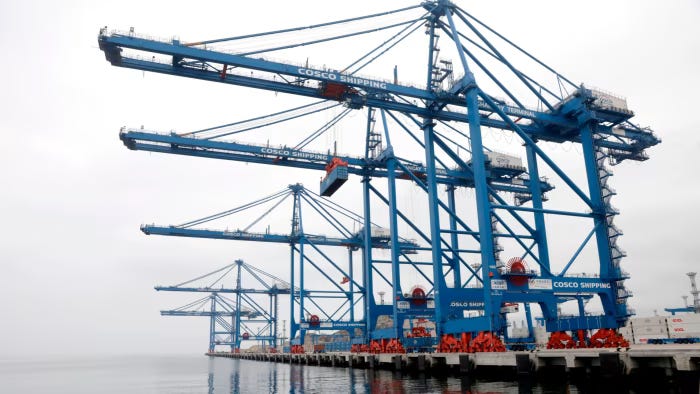The Hemisphere In-Flux 🌎 China Anchors In: Beijing’s Port Power Expands Across Latin America
China controls 31 ports in LatAm, raising U.S. security fears; gang wars surge in Ecuador, Chile, Costa Rica, shifting LatAm crime and Panama pushes for conservationist efforts in the Darién Gap.
The Hemisphere In-Flux features selected stories and news from journalists and media organizations covering Latin America and the Western Hemisphere's most pressing challenges – and opportunities: security, migration, the environment and technology and innovation. The Hemisphere In-Flux is published weekly. By Roberto Patiño and Tony Frangie.
🔥 The Hot Topic
🦅🐉 The Eagle and the Dragon
Great power competition in the Americas
China Tightens Grip on Latin Ports, Raising U.S. Security Fears
The Big Picture: Chinese companies now control or operate at least 31 active ports across Latin America and the Caribbean, far more than previously reported, according to a new report by a U.S. think tank. These include strategically vital ports in Mexico and Jamaica, raising alarms in Washington over potential impacts on U.S. trade, naval operations, and broader security interests.
What’s at Stake: Analysts warn that Chinese port ownership could give Beijing leverage over critical infrastructure, enable surveillance of cargo flows, and potentially block U.S. military access during conflicts. Recent research highlights Kingston, Jamaica, as the riskiest port for U.S. security, with Mexican ports close behind.
Why It Matters: The rapid expansion of Chinese port control reflects Beijing’s global strategy to secure trade routes and strategic footholds. As tensions rise between the U.S. and China, these footholds could have major geopolitical consequences, challenging U.S. influence and security in its own hemisphere.
🛡 Shields Up
Evolving threats and security strategies in the Americas
LatAm’s Shifting Crime Map: Gang Wars Surge in Ecuador, Chile and Costa Rica
The Big Picture: Latin America’s crime landscape is shifting fast, with Ecuador, Chile, and Costa Rica facing rising gang violence as drug trafficking routes evolve and state responses struggle to keep up. Ecuador has become the most insecure country in Latin America, with homicides surging due to turf wars among gangs filling the void left by Colombia’s FARC withdrawal. The drug trade through Ecuador and Costa Rica has fueled regional violence, while Chile faces rising crime linked to the Tren de Aragua gang.
What’s at Stake: This regional shift threatens stability across Latin America, as drug trafficking routes shift and once-stable countries like Chile and Costa Rica face escalating insecurity. Honduras remains mired in corruption-fueled violence, and critics warn of rights abuses in El Salvador’s crackdown.
Why It Matters: Growing criminal networks undermine regional economies, erode state legitimacy, and exacerbate displacement and human rights crises. These trends demand stronger international coordination, transparent governance reforms, and deeper investment in community-based prevention.
⚙ The Cutting Edge
Innovation and digitalization in the hemisphere
Uruguay Launches Innovation Push with New Innovation Program
The Big Picture: Uruguay has unveiled Uruguay Innovates (U+I), a government-led initiative to strengthen the country’s science, technology, and innovation ecosystem. President Yamandú Orsi and program leader Bruno Gili emphasized connecting academia, private sector, and international partners to boost research, entrepreneurship, and high-quality job creation.
What’s at Stake: Uruguay has improved in innovation inputs but lags in outputs, with slow productivity gains despite robust research institutions. U+I aims to close this gap, particularly in fields like life sciences, while building strong regulatory frameworks and improving the country’s global competitiveness.
Why It Matters: Uruguay’s push reflects broader regional efforts to pivot from stability to sustained growth through innovation. By fostering collaboration and investing in knowledge-driven sectors, U+I could transform Uruguay into a regional hub for high-value industries, with potential spillover benefits across Ibero-America.
🦜Spaceship Earth
Climate risks and environmental challenges in the Western Hemisphere
Darién Crackdown Halts Migration, Boosts Conservation Push
The Big Picture: Migration through the Darién Gap has nearly vanished in the last six months after Panama’s government shut down crossing routes and tightened enforcement. The move is part of a broader strategy to protect the rainforest from illegal logging, mining, and drug trafficking, while boosting conservation funding and capacity.
What’s at Stake: The crackdown could curb deforestation and environmental degradation, but challenges remain: massive waste left by past migration flows, persistent illegal mining, construction of new bridges and roads and tension with Indigenous communities over logging and development pressures.
Why It Matters: Darién is one of Central America’s largest rainforests, key for biodiversity and climate resilience. Panama’s effort shows how migration policy, conservation, and development are interlinked, revealing difficult trade-offs between security, ecological preservation, and local livelihoods.
⚡ Power Lines
Business and energy in the region
Latin America’s Renewables Now Account for Almost 68% of the Region’s Electric Generation
The Big Picture: Electricity generation in Latin America and the Caribbean reached 152 TWh in February 2025, with renewables accounting for 68%. Hydroelectric gains drove most of the 4% year-on-year increase, while wind, solar, and nuclear rounded out a diverse and steadily greening grid.
What’s at Stake: Seven countries surpassed 75% renewable electricity generation, with Paraguay, Costa Rica, Brazil, and Uruguay exceeding 92%. This shift enhances energy security, bolsters sustainable development goals, and reduces dependence on fossil fuels amid global climate pressures.
Why It Matters: The region continues to position itself as a leader in renewable energy, creating momentum for investment, innovation, and policy frameworks that prioritize sustainability and resilience in the power sector.
🧭 Americas on the Move
Migration and policy responses across the region
Trump Doubles Down on Mass Deportations, Expedited Asylum Rejections
The Big Picture: The Trump administration continues its crackdown on migrants, planning new measures to expedite deportations of asylum seekers who entered the country illegally. A proposed bill in the Senate would dramatically boost funding for ICE operations, detention centers, and border wall construction.
What’s at Stake: Critics warn these policies undermine due process, expand immigration enforcement without oversight, and put hundreds of thousands of migrants at risk. Human rights advocates also argue that the proposed law lacks transparency in its spending provisions.
Why It Matters: The proposed measures signal a hardline shift in U.S. immigration policy with potential humanitarian and legal consequences, reshaping how asylum claims are processed and how migrant communities navigate an increasingly hostile environment.






